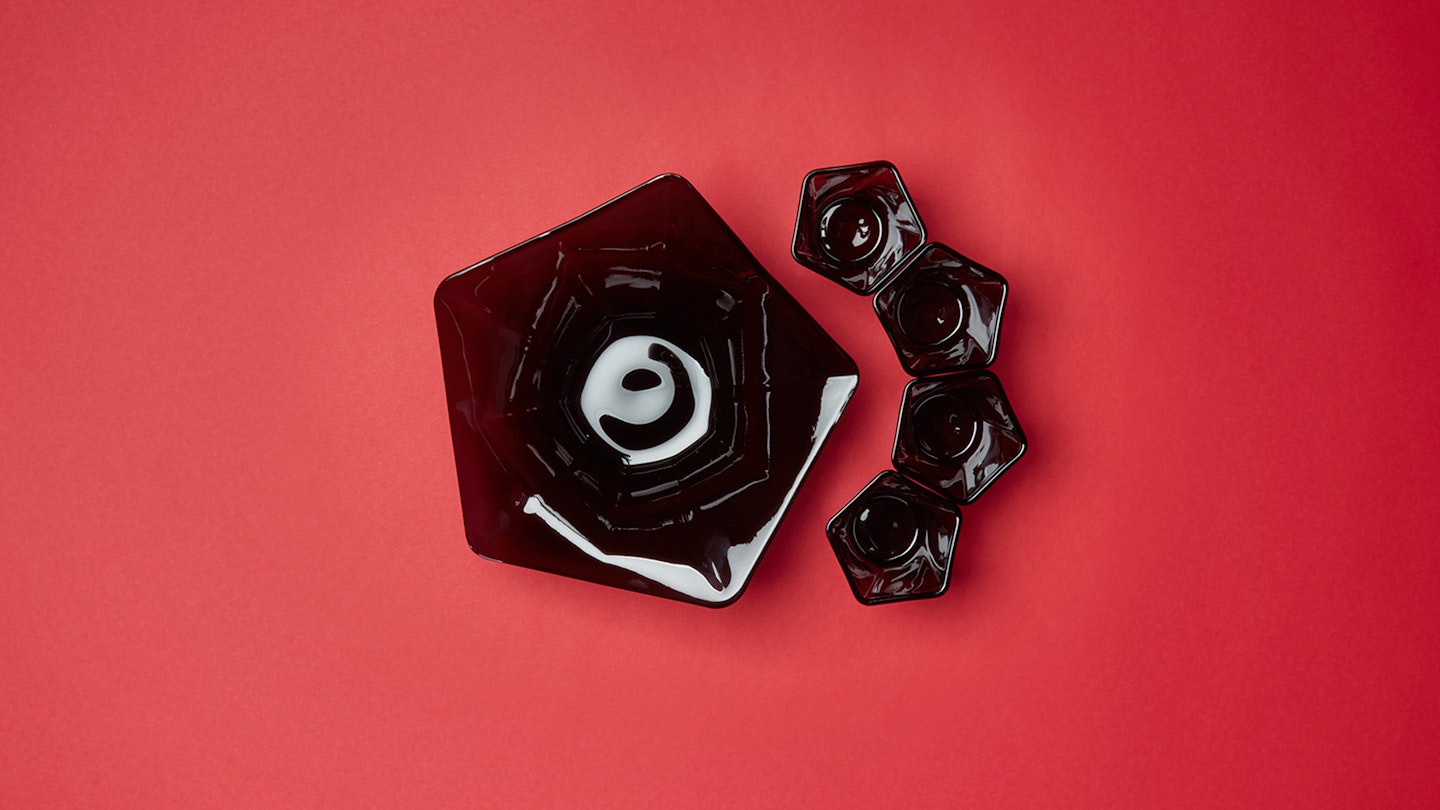If you think we’re about to tell you that smartphones are sustainable, you’re wrong.
But there is something incredible being done with the iPhones and other products that have already been discarded.
The ‘Handy’ (German for phone) cups by upcycled furniture company Pentatonic are made from recycled smartphone screens, and they’ve made phone cases from discarded DVDs and a handful of waste rice husks too.
Ahead of their Paris pop-up store opening we snuck behind the shutters to find out more about changing trash into treasure.

‘Everything is out of fashion’
New Clothes is the name of Pentatonic's pop-up store, but when you walk into the space there are no clothes there at all.
Much like the subjects in legendary tale The Emperor’s New Clothes, some might be tempted to admire the empty rails – and that’s just what Pentatonic wants, because it’s the hangers themselves that are the attraction.
Made from 10 plastic bottles, 1.2 aluminium cans and two t-shirts, a pack of four hangers are literally made out of your old clothes squished together using technology from the car industry – there’s no glue involved.
On the left of the pop-up store there are chairs made from 50 plastic bottles, a piece of shoe sole, 81.4 articles of food packaging, 22.7 aluminium cans and 2.5. T shirts, and further back cushions composed using 30 plastic bottles.
‘It’s just a really funny, engaging, silly way to present a very real technology,’ Jamie Hall, Pentatonic co-founder told The Debrief.
‘My background is actually in fashion’ (Hall has worked at Nike, Puma and Levi Strauss) ‘from personal experience, the culture there is painfully linear. Of course there is a segment of reuse in fashion, for example vintage and customization, but so much is wasted.’
This is the first collection Pentatonic has created using with fashion waste. Hall hopes the pop-up store will make people rethink their relationship with fast fashion, and open their eyes to what it is possible to make from faulty jackets and leftover design studio and factory off cuts, which have been sourced from across Europe.
‘We can bring a product waste stream back to almost the exact same source, we can recycle a T shirt into the thing it was hanging on. Six months ago you had a T shirt and now it’s holding up another T shirt.’

How does it actually work, though?
How on earth do you get odd and ends of fabric and waste materials, and make them into completely different products?
Pentatonic’s co-founder Johann Boedecker explains; ‘Pentatonic's unique technologies allow for the transformation of polymers such as polyester, a widely deployed material in the fashion industry, into dramatically different manifestations such as engineered structural furniture or flexible, breathable Plyfix matrix-based felt. All the while always maintaining re-recyclability.’
Using machines normally reserved for putting cars together, Pentatonic is able to forgo the use of glue and other solvents and create sturdy structures from fabric and plastic. Pentatonic doesn’t own its own factory or high-tech kit, instead it uses already existing machinery.
Once the fabric waste is sorted by colour and composition, collages are created around textures and shades, then 3D forming technology turns them into objects that can be used.
And what happens when you no longer have a use for your Pentatonic product? Don’t throw it out! Pentatonic will buy it back from you and make them into new products, yes, really.

WATCH NOW: How To...Make a DIY 90s T-Shirt
What does the future of recycling look like?
With the UK soon to introduce a plastic bottle deposit scheme, and with a plastic bag fee already in place, we asked Hall what he thinks the future of recycling will look like.
‘Things like the plastic bag tax are good because they make people more conscious. We’re just trying that but in a different way. I think people will be very conscious of their purchasing decisions in the future which is great.
‘I have a one-year-old daughter, and I hope that in 20 years, she doesn’t understand the concept of rubbish or waste, except metaphorically. “Why would you throw that away? That’s valuable, I could make something from it, I could get money back.”
'It’s all just part of the evolution of the circular economy. Even if you’re the most pessimistic person in the world about the environment, you have to consider what materials you are going to use in the next 50 years.’
New Clothes will also be the first showing of Pentatonic’s ‘Fractured’ series, the furniture collaboration with iconic New York based design studio Snarkitecture.
New Clothes by Pentatonic is open until April 22nd at 10 rue des Gravilliers, 75003, Paris.
And here are some other sustainable Pentatonic products we’ll probably all be using in 20 years:
Debrief Pentatonic Recycled Products Shop
 1 of 7
1 of 7Large Handy Glass
 2 of 7
2 of 7New Clothes Hangers
 3 of 7
3 of 7Husky iPhone Case
 4 of 7
4 of 7Bottle Wallet
 5 of 7
5 of 7Medium Bottle Cushion
 6 of 7
6 of 7Glass Bowl
 7 of 7
7 of 7Pentatonic Airtool Chair
Follow Phoebe on Twitter @PhoebeParke
This article originally appeared on The Debrief.
